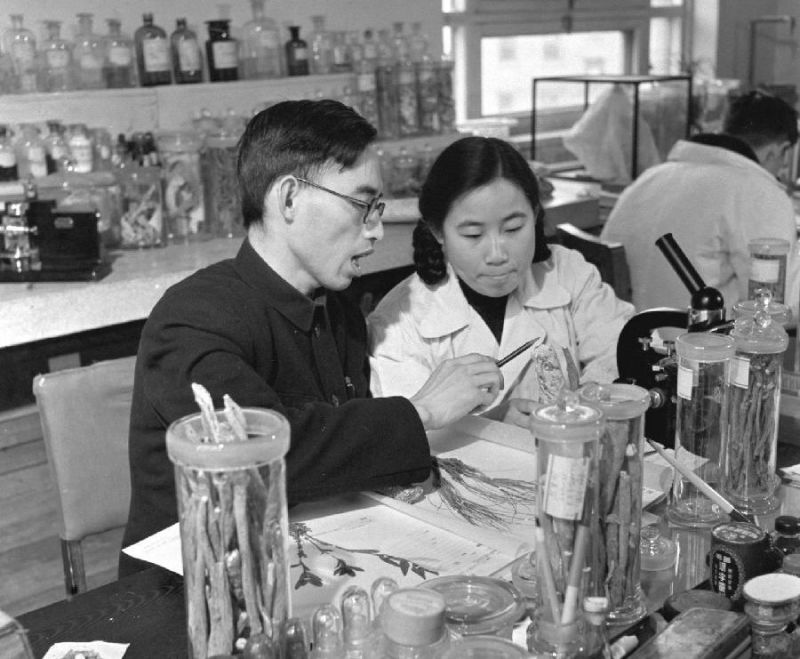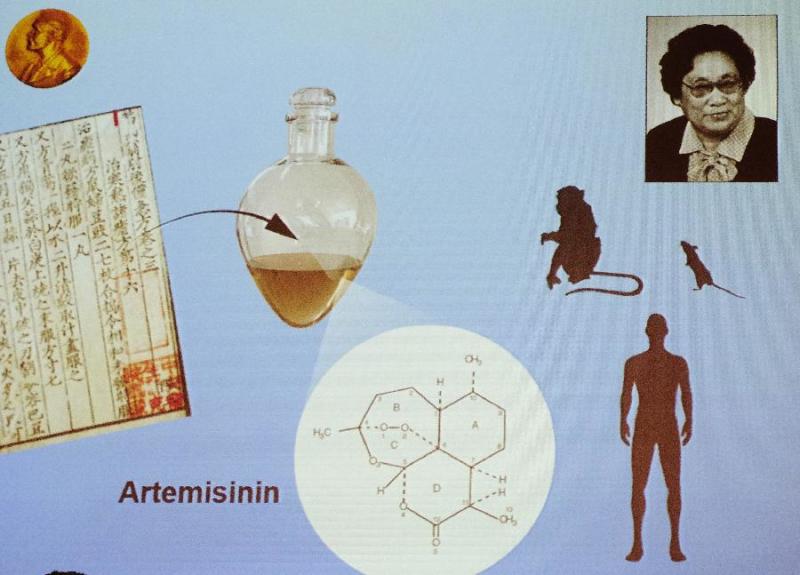


Chinese scientist Tu Youyou on October 5 won the Nobel Prize in physiology or medicine amongst a trio for discovering parasite therapies. Together, the three scientists found “therapies that have revolutionized the treatment of some of the most devastating parasitic diseases”. 85-year-old Tu is awarded this world-renowned prize for her contribution to reducing the death rate of malaria, minimizing patients’ suffering and promoting mankind’s health. This is what science is all about.
Tu’s name “Youyou”, or “Yuyu”, came from the Classic of Poetry, the oldest existing collection of Chinese songs and odes. The characters depict the cheerful sounds deer make when calling for mates. Tu has spent 40 years’ time on scientific research. Although the Nobel Prize did not come to her until four decades later, it is definitely the most privilege reward that recognizes Tu’s dedication and perseverance in discovering artemisinin.
Tu’s finding has saved millions’ lives during the 40 years. This also proves the value of her research product. The reward is never too late in that aspect. The moment of joy and satisfaction when she discovered the artemisinin after all kinds of failures in experiments is eternal.
Tu has won some attention when she got the Lasker Award in 2011. But there is no way to compare her popularity back to the attention she is receiving today. As the first Chinese mainland Nobel Prize Winner of natural science award, Tu’s winning completely surprised Chinese people, who have long been wondering when the first Chinese Nobel Laureate in natural science would appear.
Tu is an alumni of Peking University. She studied at the Peking University Health Science Center, Department of Pharmaceutical Sciences, from 1951 to 1955. Not only is Tu the first Chinese Nobel Laureate in natural science, she is the first Nobel Laureate who received all scientific trainings in China. The award she won made Chinese scientists gain tremendous confidence.
Let’s backtrack to 40 years ago. Tu accomplished the breakthrough findings without access to any advanced equipment, communication with outside world and papers to research. However, over the 40 years, improvements and innovations have transformed everything. Nowadays, Chinese scientists have the passion to invent. As Premiere Li Keqiang mentioned in his letter, “Tu's winning the prize signifies China's prosperity and progress in scientific and technological field”.
Evidently, Chinese scientific research has been playing a leading role in the world. And one can be sure that there is going to be a second or third “Tu” coming.
Tu’s winning will help people come to realize that all those international publications and journals, whether it is the Nobel Prize, SCI publishing, Nature, or Science, are all just gimmicks of measuring tools. There’s no need to improperly belittle oneself. The sole key is to be oneself and try one’s best with confidence. There had been doubts about “whether there would be a Chinese national awarded the Nobel Prize.” This sort of doubts is unnecessary. The scientific awards are equal to all, as long as the research findings are good enough.
Tu’s record-breaking winning serves as a reminder to those who are too eager for instant success. Science is never about instant success. There is no way to measure how much you spend on scientific research and compare it with how much reward you get.
Some may question about Tu’s lacking a doctoral degree, international experience, and a title as academician of the Chinese academy. Tu’s experience is unique. It is hard to predict whether the next Chinese Nobel Laureate may have any of these backgrounds. There’s no need to tag a scientist and to look at the whole scientific community through these kinds of tags.
The fact that Tu has none of these three backgrounds also reminds us that science should be more accessible to all. One shall be able to become a scientist no matter what kind of background he or she comes from, as long as one devotes into scientific research. There have been discussions on people who really love science are never aiming the awards. They might not achieve much during their whole lives. But their contributions are infinite. They work so hard to prove the wrong way so that the future researcher will be closer to the right one.
For Chinese scientists, a more diverse and flexible measurement and awarding system are needed. A lot of Japanese Nobel Laureates came from companies and independent institutions. In the U.S., companies such as Microsoft hire a lot of talented scientists for their researches. In a recent reform regulation jointly passed and distributed by General Office of the State Council of the People's Republic of China and General Office of the Communist Party of China, decisions have already been made on transforming the current measuring system from research product quantity to its quality and how innovative the product is. Any real contribution the research has made to the society is also counted. This kind of regulation will allow more space and time for Chinese scientists to devote into their researches.
Artemisinin and science saved lived around the world. Tu saved the confidence of Chinese scientists, who will care less about whether a Chinese scientist be awarded the Nobel Prize in the future.



William Campbell, Satoshi Omura and Tu Youyou jointly won the 2015 Nobel Prize for medicine for their work against parasitic diseases.
(Translated by Shen Chen and Joanna Law from Commentary 《屠呦呦获诺奖 让我们更自信更自省》, published on People's Daily, Oct.6, 2015)
Day|Week